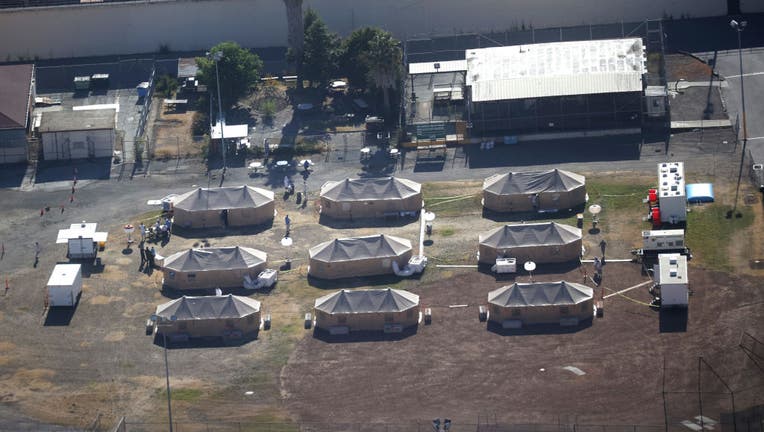Attorneys urge California to move incarcerated to front of vaccination line

SAN QUENTIN, CALIFORNIA - JULY 08: A view of a new emergency care facility that was erected to treat inmates infected with COVID-19 at San Quentin State Prison on July 08, 2020 in San Quentin, California. Over 1,400 inmates and staff at San Quentin S
SACRAMENTO, Calif. - Attorneys representing California inmates are urging state and federal officials to advance about 1 of every 10 prisoners to the front of the line for coronavirus vaccinations, saying it would help ease the burden on hospitals while helping control outbreaks inside state lockups.
They’re asking Gov. Gavin Newsom and U.S. District Judge Jon Tigar to order the swift vaccinations of every inmate who hasn’t already been infected, starting with those who are most vulnerable.
More than 4,400 of the state’s 95,000 inmates currently have active infections, including 1 of every 3 at a Central Coast men’s prison and 1 of every 10 at the state’s largest women’s facility where an advocacy group says officials bungled their response.
And that’s not the worst of it, said Steve Fama, an attorney with the nonprofit Prison Law Office that represents inmates in the largest class-action settlement over prison medical conditions.
There have been about a dozen bigger outbreaks in the last month, accounting for about a third of the 167 inmate coronavirus deaths, he said. Corrections officials said active cases peaked Dec. 20 at 10,721 systemwide.
"As much of a disaster as it was the first nine months of the pandemic, the last 30 days have far exceeded in terms of the statewide number of cases," he said.
In that, prisons are tracking the rest of California, which has seen cases skyrocket in recent weeks, stretching hospitals and intensive care units to the breaking point.
Counties already are reporting vaccine shortages that some advocacy groups fear will worsen as the state allows shots for residents age 65 and up.
Corrections officials began vaccinating inmates before Christmas in skilled nursing facility-level housing units at the Central California Women’s Facility in Chowchilla and the state’s two medical facilities for men in Vacaville and Stockton, all in the Central Valley.
Of the 2,945 who qualified, only about 10% refused the shots, officials said.
Officials this week started vaccinating employees at all 35 state prisons under the first tier approved for the shots, with nearly 19,000 employees or about 30% getting shots so far. More than 2,600 employees are actively infected statewide and 16 have died — five of them since Christmas.
But other inmates don’t yet qualify under state guidelines, so attorneys want public health officials and Newsom — if necessary spurred by a federal court order — to inoculate every inmate who hasn’t already had the virus.
That’s about 42,000 inmates, a number that could take four weeks to vaccinate, J. Clarke Kelso, the federal court-appointed receiver who controls the prison medical system, said Thursday.
Inmates’ attorneys want to start by rapidly vaccinating about 9,000 inmates who have underlying medical conditions and haven’t previously been infected. That would require less than half of 1% of the nearly 2.5 million vaccine doses shipped to California so far.
Kelso said about 5,200 of those inmates could be vaccinated in about a week’s time and are already next in line whenever the state agrees, though he said state officials remain concerned about the prison system "skipping ahead" of others. He said about 2,000 inmates age 65 and up are being vaccinated this week under the state’s new rules.
The attorneys have been urging federal and state judges and the governor since March to free more inmates to create space to isolate the sick and protect those who are vulnerable. Newsom allowed the earlier release of thousands of inmates but has since balked at more mass releases, and judges have so far been reluctant to order more.
"A lot of that problem can be addressed in another way, by vaccinating people," Fama said. "Then the need for additional space is reduced ... because the number of people who potentially need to be quarantined is less."
Newsom’s administration said in a court filing Wednesday that broad inmate inoculations will being "as soon as possible" and as early as next week.
Doing so, argued Fama, would "reduce the pressure on the hospitals that these people are sent to, which are the community hospitals — the same ones that everyone goes to and are currently overtaxed."
The advocacy group California Coalition for Women Prisoners alleged that prison officials failed to prepare for the outbreak at the state’s largest women’s prison, with women quarantined for the virus lacking cleaning supplies or consistent access to medical care and prescriptions. At one point a quarter of the population was infected, but that has eased since it peaked Jan. 3.
"Initially, there may have been delays in medication administration, but this was immediately addressed," said Kelso spokeswoman Liz Gransee, and the state increased deliveries of cleaning and disinfecting supplies to all prisons since the pandemic began.
The advocacy group said some women have been cited for disciplinary violations if they asked to be allowed to take showers or make phone calls to family members, though corrections department spokeswoman Terri Hardy categorically denied the group’s report that some women "were hogtied and placed in cages as punishment."

